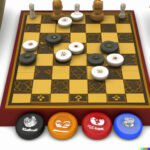Looking for a fun and engaging way to spend time with family and friends? Look no further than classic board games. From the competitive nature of Monopoly to the strategic thinking required for Chess, there’s something for everyone on this list of classic board games. These timeless favorites have been enjoyed by generations and continue to be popular today.
The appeal of classic board games lies in their ability to bring people together and provide a shared experience that is both entertaining and mentally stimulating. Whether it’s the thrill of landing on Park Place in Monopoly or the satisfaction of outmaneuvering your opponent in a game of Risk, these games offer a level of engagement that is unmatched by many other forms of entertainment.
In this article, we will delve into the history, cultural impact, nostalgia factor, and benefits of playing classic board games. We will also explore modern variations and updates that have kept these games relevant in today’s digital age. So get ready to roll the dice, make your move, and discover why classic board games continue to stand the test of time.
History of Board Games
Classic board games have a rich and varied history, dating back centuries and spanning various cultures around the world. From ancient Egyptian Senet to the Chinese game of Go, board games have been a source of entertainment, skill development, and social interaction for people throughout history. The evolution of classic board games has been shaped by advancements in technology, changes in societal norms, and cultural influences.
Here are some key points to consider when tracing the origins and evolution of classic board games:
- Ancient Origins: Many classic board games have their roots in ancient civilizations, where they were often used for religious or educational purposes. Games like Mancala in Africa and Pachisi in India date back thousands of years and have been passed down through generations.
- Medieval and Renaissance Period: During the Middle Ages and Renaissance era in Europe, board games became more widespread among nobility and commoners alike. Chess, Backgammon, and Checkers emerged as popular pastimes during this time, with rules becoming more standardized.
- Industrial Revolution and Beyond: The industrial revolution brought about significant advancements in the production of board games, making them more accessible to a wider audience. The 20th century saw the introduction of iconic classics such as Monopoly, Scrabble, and Clue, which have remained popular to this day.
The history of board games is a testament to their enduring appeal across generations and their ability to adapt to changing cultural landscapes. As we continue to celebrate these timeless pastimes, it’s important to recognize the diverse origins that have contributed to the vast array of classic board games enjoyed by people all over the world.
Top 10 Classic Board Games
Classic board games have been a staple in households for generations, providing entertainment and bonding experiences for families and friends. These timeless games have not only stood the test of time but continue to remain popular in today’s digital age. Below is a list of the top 10 classic board games that have captured the hearts of players worldwide.
| Classic Board Game | Description |
|---|---|
| Monopoly | A real estate trading game that has players aiming to become the wealthiest player through buying, renting, and selling properties. |
| Scrabble | A word game where players use lettered tiles to create words on a playing board, earning points based on letters used and placement on the board. |
| Chess | An ancient strategy game with two players on opposite sides of the board, vying to checkmate their opponent’s king while protecting their own. |
These classic board games offer a blend of strategy, skill, and luck while also fostering social interaction among players. Many of these games also come in modern variations and updated editions, ensuring that they stay relevant in today’s gaming landscape. From family game nights to casual get-togethers, these timeless classics continue to bring joy and entertainment to people of all ages.
So whether you’re rolling dice in Monopoly or strategically placing your tiles in Scrabble, classic board games are sure to remain beloved pastimes for years to come.
Strategy and Skill
Classic board games have stood the test of time not only because of their entertainment value, but also because of the strategic and skill-based aspects that they offer to players. Games like chess, Go, and Scrabble require critical thinking, forward planning, and a deep understanding of game mechanics.
These classic board games challenge players to analyze different scenarios, anticipate their opponents’ moves, and make decisions that will ultimately lead them to victory. This level of mental stimulation and engagement is one of the main reasons why classic board games continue to be enjoyed by players of all ages.
Furthermore, classic board games provide a platform for individuals to hone their problem-solving skills and develop their ability to think strategically. By engaging in gameplay that requires tactical decision-making and adaptability, players can enhance their cognitive abilities while having fun at the same time. The analytical skills and logical reasoning developed through playing these games can also be beneficial in other areas of life such as academics, career endeavors, and personal relationships.
The competitive nature of classic board games also fosters an environment where players can showcase their skills and expertise. Whether it’s outmaneuvering an opponent in a game of Risk or formulating complex word combinations in Scrabble, classic board games allow individuals to demonstrate their mastery in various aspects such as spatial awareness, vocabulary, pattern recognition, and more. This element adds an extra layer of excitement to gameplay as players strive to outwit each other using their strategic prowess.
| Classic Board Game | Main Skill Involved |
|---|---|
| Chess | Critical Thinking |
| Scrabble | Vocabulary & Language Skills |
| Risk | Strategic Planning & Decision Making |
Cultural Impact
Classic board games have had a significant impact on popular culture, shaping the way people interact and enjoy leisure time. These games have become ingrained in society, with many iconic board games becoming synonymous with family gatherings, social events, and even popular media. From being featured in movies and television shows to influencing fashion and art, classic board games have made a lasting impression on popular culture.
Entertainment Industry
Classic board games have played a notable role in various forms of entertainment, from inspiring movies like “Clue” and “Jumanji” to being the focus of TV game shows like “The Game of Life.” These references and adaptations have helped solidify the place of board games in popular culture, introducing them to new generations and keeping their timeless appeal alive.
Social Influence
Not only have classic board games left their mark on the entertainment industry, but they have also influenced social interactions. Board games provide a platform for connecting with others, fostering friendly competition, and promoting cooperation. The shared experiences that come from playing classic board games contribute to the cultural significance of these pastimes, fostering bonds between friends and family members.
Educational Impact
Board games such as Scrabble, Trivial Pursuit, and Chess not only entertain but also educate. These classic games have inspired learning through play by promoting language skills, critical thinking, and strategic planning. Their influence has extended beyond the realm of entertainment into educational settings where they are used as tools for learning and development. Thus, their impact on popular culture extends to intellectual growth as well.
Nostalgia Factor
Classic board games hold a special place in the hearts of many, as they evoke feelings of nostalgia and provide an emotional connection for players. The sense of nostalgia associated with classic board games stems from the memories and experiences that individuals have had while playing these beloved games with friends and family. This emotional connection often leads to a deep appreciation for the games and encourages individuals to continue playing them, passing them down through generations.
The nostalgia factor of classic board games is also evident in the sense of comfort and familiarity that they provide. Many individuals have fond memories of spending time with loved ones, sharing laughter, competition, and bonding over these timeless games. Whether it’s the thrill of rolling the dice in Monopoly or the suspense of sinking a battleship in Battleship, classic board games can transport players back to simpler times and create a sense of warmth and joy.
For many people, playing classic board games also serves as a way to relive cherished childhood memories. Whether it’s recalling holiday gatherings or rainy day activities, these games are often associated with positive experiences that hold sentimental value. As such, the nostalgia factor plays a significant role in keeping classic board games relevant and beloved by individuals of all ages.
- Monopoly
- Clue
- Scrabble
- Risk
- Battleship
- Life
- Sorry.
- Connect Four
Pictionary>
Candy Land>
Modern Variations
Classic board games have not only stood the test of time but have also adapted to the changing times by introducing modern variations and updates. These new versions bring a fresh take on beloved classics, appealing to a new generation of players while still retaining the core elements that made the original games so popular. Some modern variations include updated graphics, new game mechanics, and even digital versions that make these classic board games more accessible than ever.
One example of a classic board game with modern variations is Monopoly. While the original game remains a favorite among many, there are now numerous themed editions based on popular franchises such as Star Wars, Game of Thrones, and even video games like Fortnite. These special edition versions add a new level of excitement for fans of the original game while bringing in new players who are drawn to the familiar themes.
Another example is Clue, which has undergone various updates over the years. From different character choices and themed settings to updated gameplay mechanics, modern variations of Clue keep the essence of deduction and mystery solving intact while offering a fresh and captivating experience for both old and new players alike. These modern variations ensure that classic board games remain relevant in today’s gaming landscape while honoring their rich history and enduring appeal.
Whether it’s through innovative game design or incorporating technology into gameplay, modern variations and updates of classic board games serve as a testament to their adaptability and lasting impact on popular culture. By staying true to their roots while embracing change, these timeless favorites continue to captivate players of all ages around the world.
Benefits of Playing
In conclusion, classic board games have proven to stand the test of time and continue to be popular among people of all ages. Their enduring appeal can be attributed to a variety of factors, including the strategic and skill-based aspects that challenge players, the cultural impact they have had on popular culture, and the nostalgia factor that creates an emotional connection for many.
Even in today’s digital age, classic board games remain relevant and continue to offer numerous cognitive, social, and emotional benefits for those who play them.
One of the key reasons why classic board games are still relevant in today’s digital age is the cognitive benefits they offer. Games like chess, Scrabble, and Monopoly require players to think critically, strategize, plan ahead, and make quick decisions – all skills that are valuable both in game play and in real life. Playing these games can also improve memory, concentration, and problem-solving abilities.
Furthermore, classic board games provide social benefits by bringing people together for face-to-face interaction and fostering communication and cooperation. They create opportunities for bonding with family and friends while also promoting healthy competition.
Emotionally, these games can evoke feelings of joy, excitement, and satisfaction when players experience success or overcome challenges. In essence, classic board games offer a unique form of entertainment that stimulates the mind, encourages socialization, and elicits positive emotions – which is why they will likely continue to be enjoyed for generations to come.
Frequently Asked Questions
What Is the Most Popular Classic Board Game?
The most popular classic board game is arguably chess. With its origins dating back to the 6th century, chess has stood the test of time and is still widely played and enjoyed around the world today. Its combination of strategy, skill, and competition make it a timeless classic that continues to attract players of all ages.
What Are the Best Board Games of All Time?
Determining the best board games of all time can be subjective, as different people have different preferences. However, some games that are often included in such lists are Settlers of Catan, Scrabble, Monopoly, Risk, and Ticket to Ride. These games have garnered widespread popularity and have left a significant impact on the world of board gaming.
What Is One of the Oldest and Most Popular Board Games?
One of the oldest and most popular board games is Backgammon. Dating back over 5,000 years to Mesopotamia, Backgammon has a rich history and continues to be enjoyed by players worldwide.
Its mix of strategy and chance makes it an engaging game that has stood the test of time. From ancient civilizations to modern times, Backgammon remains a beloved pastime for many people.

I love playing all kinds of games – from classics like Monopoly to modern favourites like Ticket to Ride.
I created this blog as a way to share my love of board games with others, and provide information on the latest releases and news in the industry.





